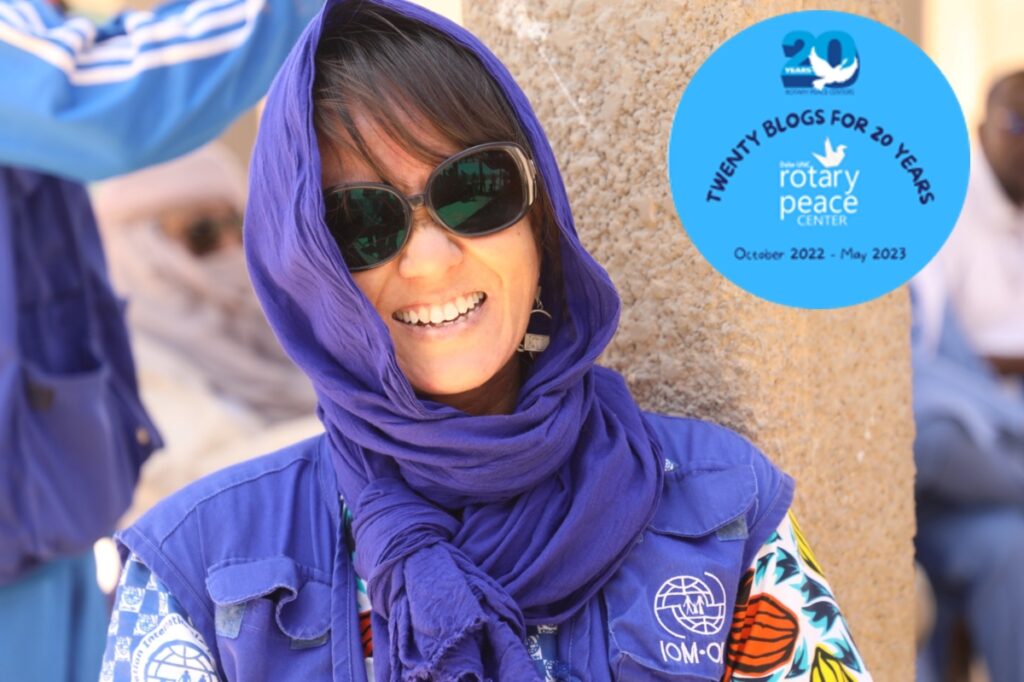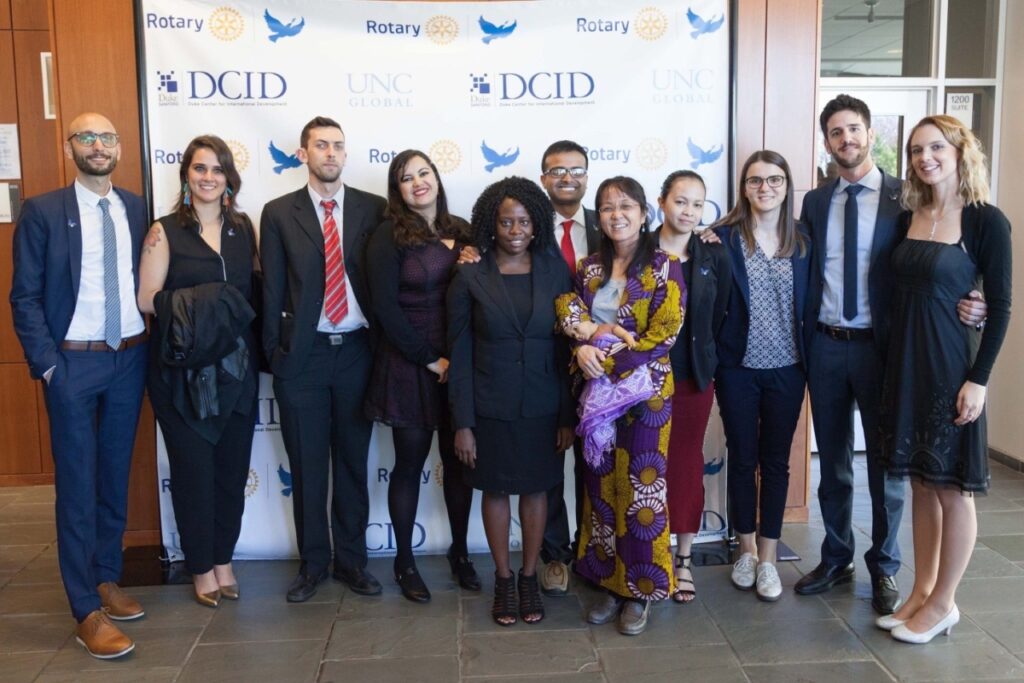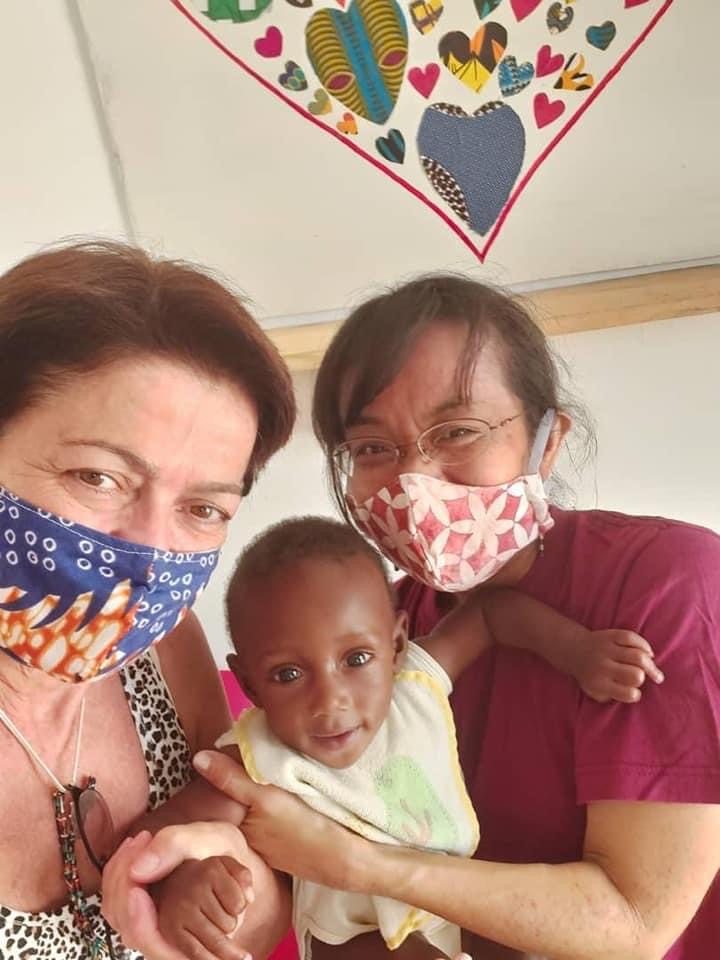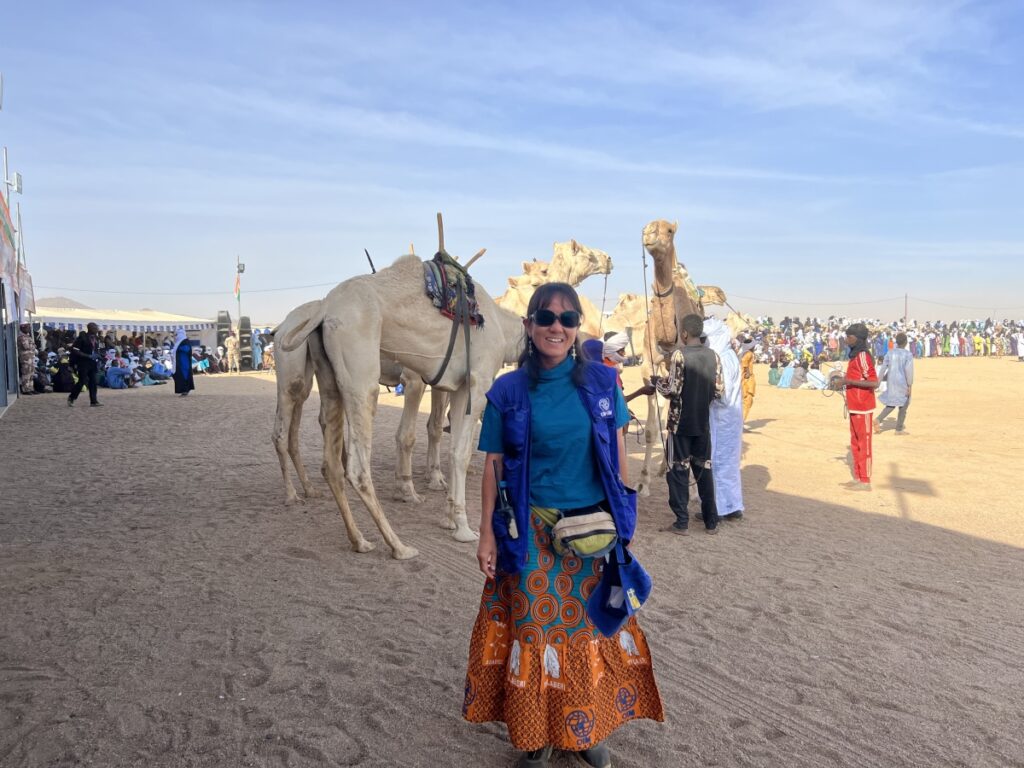Natsuko Sawaya, Class 14 (2015-2017)
Twenty Blogs for 20 Years
While working at an international preschool in Tokyo, Natsuko Sawaya (UNC MPH ’17) was awarded an Ambassadorial Scholarship by the Rotary Foundation to study at the University of Bologna in Italy, where she had the opportunity to travel to sub-Saharan Africa to observe early childhood development and practices in Senegal, the Republic of the Congo, and Zimbabwe. After four years working with the Japanese Embassy and International Organization for Migration (IOM) in Mauritania on border management and community stabilization initiatives, she was inspired to apply for the Rotary Peace Fellowship and was accepted and admitted to UNC’s Gillings School of Global Public Health in the Maternal, Family, and Child Health concentration. Since graduation, Natsuko has served as a Protection Officer for the IOM in Niger, coordinating the health unit’s efforts to provide direct healthcare assistance to migrants at transit centers in the northern part of the country while working to stabilize border communities severely impacted by migration from sub-Saharan Africa to the Mediterranean.
 I first learned about the Rotary Peace Fellowship as a university student in Japan and knew I wanted it from the beginning. However, I didn’t have enough education or sufficient work experience to apply at that time. Instead, I ended up applying for the Rotary Ambassadorial Scholarship, aiming to study international relations as it relates to children.
I first learned about the Rotary Peace Fellowship as a university student in Japan and knew I wanted it from the beginning. However, I didn’t have enough education or sufficient work experience to apply at that time. Instead, I ended up applying for the Rotary Ambassadorial Scholarship, aiming to study international relations as it relates to children.
I chose to study early childhood education at the University of Bologna in Italy, focusing on children up to three years old. The university was in the same region as Reggio Emilia, a city renowned for its innovation in early childhood education. Rich in various topics related to children, lectures at the university inspired me to learn about child development in orphanages and other types of children’s homes where biological/extended families were absent. In addition to working in Bologna and Regio Emilia, I also chose to go observe institutions in Zimbabwe, the Republic of the Congo, and Senegal, which allowed me to see a reality in that corner of the world that I had never seen or felt before with my own senses. Then I had the chance to work for the Japanese Embassy and at the International Organization for Migration (IOM – UN Migration Agency) in Mauritania. These experiences led me to step forward to work in the places where human security is not guaranteed for various reasons (poverty, conflicts, environmental degradation, etc.). I was also amazed to see how Rotarians and the Rotary Foundation were making a difference abroad; my international experiences let me learn human value, love without borders, and the sense of peace created through engagement and human touch in each single action. I said to myself that I would apply for the Rotary Peace Fellowship once I became eligible for it.
When I finally could apply for the fellowship, I chose to apply to the Duke-UNC Rotary Peace Center, where the University of North Carolina was the only university among the Rotary Peace Centers which provided options to pursue my area of study. I was enrolled in the Department of Maternal and Child Health in the Gillings School of Global Public Health, where I continued to study infant growth in the context of developing countries. During my time as a Rotary Peace Fellow, I learned a variety of points of view towards conflict resolution and ways to plant the seeds of inner peace in people in different circumstances in conflicted, unstable, and deprived zones in the world. I learned this from my studies and experiences as well as from other Peace Fellows. Through the program’s Applied Field Experience, I also had the opportunity to travel to Malawi to observe the Kangaroo Mother Care (KMC) method, a technique used to raise the survival rate of newborns without incubators through skin-to-skin contact. Once again, the Rotarians who supported the Rotary Peace Centers program as well as the staff working for these programs amazed me with their belief in Peace Fellows and their engagement with their community – within and beyond borders and in any corner of the world where Rotary clubs contribute to make a difference in the lives of the local population.
Since I graduated in 2017, I have been working for the IOM in Niger. My title is Protection Officer, but I work more as the coordinator of the health unit. Niger is one of the least developed countries in the world according to different indices, including UNDP’s Global Multidimensional Poverty Index. It is also one of the important transit countries for many sub-Saharan peoples looking for a better future and for those being deported from the countries bordering Niger to the north. The adoption of Law 2015-36 by the Nigerien government criminalizes irregular migration; however, many still try to transit through the country by taking more dangerous routes through the desert, risking their lives.
The IOM Niger’s health unit provides direct healthcare assistance for stranded migrants accommodated at IOM transit centers in Niger who would like to go back to their countries/localities of origin. We work to reinforce the resilience of local and host communities by improving health structures and WASH-related situations. We also strengthen border management capacity by contributing to public health surveillance in border communities and work on any other public health issues related to migration. IOM Niger has various units such as Protection, Community Stabilization, Immigration and Border Governance, Labor Mobility and Social Inclusion, etc., which I have been trying to integrate with public health components to tackle challenges holistically while also taking into consideration the One Health approach, which addresses human, animal, and environmental health. I also work to maintain a good relationship with the health and local authorities to make a positive difference to the communities of Niger, especially where the impacts from migration are significant.
This is my 6th year with IOM Niger, and there have been a lot of heartbreaking moments. There have also been heartwarming moments. Whatever comes next for me, thanks to the lessons from my Rotary Peace Fellowship and experiences at IOM Niger, I think I will keep working in areas where the living conditions are quite challenging, strengthening local resilience and the quality of early childhood life for every newborn. Investing in children remains very important to me, and I think often about how we as adults with humanity can create peaceful environments for children, providing future generations with quality of life.
From the Rotary Ambassadorial Scholarship to the Rotary Peace Fellowship – even now, my Rotary host families and coordinators, Rotary Foundation and Peace Center staff, professors, and many, many Rotarians keep supporting and encouraging me in various ways. I cannot name them here because there isn’t enough space, but I’d like to THANK YOU collectively here and individually in my heart. You continue to enrich my life and work experiences. Thank you for these opportunities!
NOTE: Some readers might have heard about some security and humanitarian situations in Niger. Here is some reporting that is very much related to my work. While these sources are in French, the images can tell the story:
06 avril 2023 africanews
07 avril 2023 TV5
21 avril 2023 ORTN
21 avril 2023 France 24


